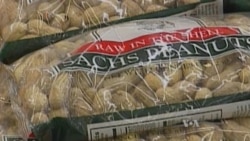New dietary guidelines say it’s ok to feed your infant small amounts of peanuts in order to prevent a serious allergy later in life.
The new guidelines from the National Institute of Allergy and Infectious Diseases (NIAID), provide information for how to introduce peanut-containing food for high, moderate and high-risk infants.
"This update to the peanut guidelines offers a lot of promise," says allergist Stephen Tilles, MD, president of the American College of Allergy, Asthma and Immunology (ACAAI). "Peanut allergy has literally become an epidemic in recent years, and now we have a clear roadmap to prevent many new cases moving forward. The Learning Early About Peanut allergy (LEAP) study, the study that paved the way for the updated guidelines, has had a dramatic impact on day-to-day patient care. In fact, during my career as an allergist I cannot think of a single publication with more of an impact."
The new guidelines state that for high-risk infants, those with severe eczema and or egg allergies, parents can introduce peanut-containing foods as early as 4 to 6 months, after determining that it is safe to do so.
"If your child is determined to be high risk, the new guidelines recommend evaluation by an allergy specialist, which may involve peanut allergy testing, followed by trying peanut for the first time in the specialist's office," says allergist Matthew Greenhawt, MD, a co-author of the guidelines. "If a child is tested and found to have peanut sensitization, meaning they have a positive allergy test to peanut, from that positive test alone we still don't know if they're truly allergic. Peanut allergy is only diagnosed if there is both a positive test and a history of developing symptoms after eating peanut-containing foods."
A reaction to the peanut skin test of 8 mm or larger could indicate an allergy, according to the guidelines.
However, researchers say a positive test for peanut allergies is actually a poor indicator of allergy as “studies have shown infants who have a peanut sensitivity aren't necessarily allergic.” "In fact," Dr. Greenhawt notes, "in the LEAP study, infants sensitized to peanuts showed the most benefit from early introduction of peanut-containing foods."
"An allergist may decide not to have the child try peanut at all if they have a very large reaction to the skin test. Instead, they might advise that the child avoid peanuts completely due to the strong chance of a pre-existing peanut allergy,” according to the news release. “Other allergists may still proceed with a peanut challenge after explaining the risks and benefits to the parents."
Infants with a moderate risk, who have moderate eczema, and have started solid food, do not need to be evaluated, according to the guidelines. For these infants, parents can give their infant peanut-containing food at home starting at 6 months.
Low risk infants can also be given peanut-containing food at 6 months of age.
Parents should not give infants whole peanuts as they are a choking hazard, and peanut-containing food should not be the first solid food given to your infant.
"The guidelines are an important step toward changing how people view food allergy prevention, particularly for peanut allergy," says Dr. Tilles. "They offer a way for parents to introduce peanut-containing foods to reduce the risk of developing peanut allergy."
The guidelines were published in Annals of Allergy, Asthma and Immunology, the ACAAI's scientific publication, as well as other scientific journals.









